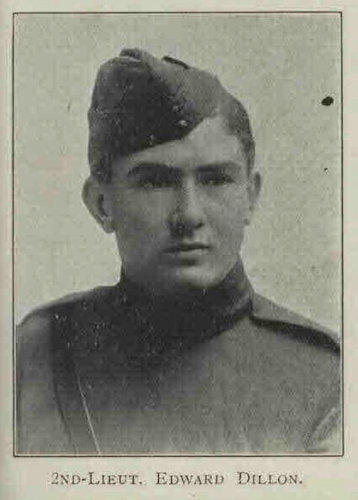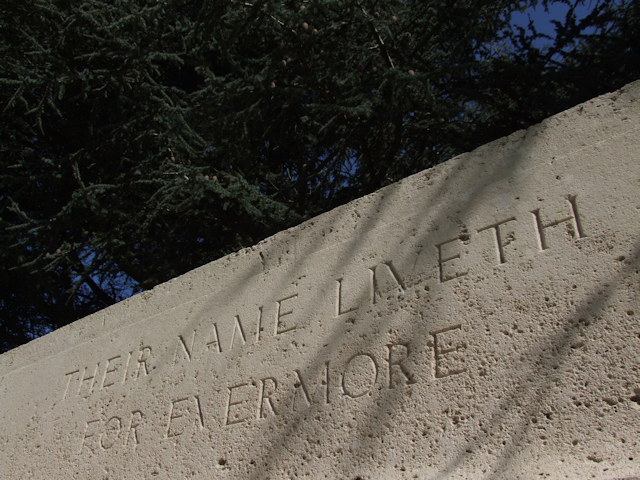Name
Edward Joseph Dillon (MM)
Conflict
First World War
Date of Death / Age
12/04/1918
23
Rank, Service Number & Service Details
Second Lieutenant
Royal Air Force
7th Training Depot Station.
Awards: Service Medals/Honour Awards
Not Yet Researched
Military Medal
Cemetery/Memorial: Name/Reference/Country
KENSAL GREEN (ST. MARY'S) ROMAN CATHOLIC CEMETERY
8117
United Kingdom
Headstone Inscription
Not Researched
UK & Other Memorials
St Edmunds College Memorial, Old Hall Green
Biography
The following text was transcribed from The Edmundian (1914-1919) – The contemporary magazine of St Edmund’s College:
"Eddie" Dillon was at St. Edmund's from 1903 to 1908, two of these years he spent at St. Hugh's. Throughout he showed himself to be a first-class student, much loved by all who knew him, for he was, in the best possible sense, a good boy, with a quiet, simple charm which some eminently good people seem to lack. He seemed to act on the real belief, (the humble reality, not a pose), that others were all as good himself. He would have been quite the last to admit, for lack of realization, what was the undoubted fact, that his company and example were among the great powers for good during his stay here. He was by no means the only one to fee! a little regretful on the day of his final departure from the College.
It was decided that he should enter upon a commercial career; this meant a period of special preparation, on the conclusion of which he took a position with a large Insurance Company.
In August 1914, immediately on the outbreak of War he joined the R.A.M,C. shortly he became Corporal, and as such went to France in January 1916.
He was in the second battle of Ypres, and in the battle of Loos. We are beginning to understand, we civilians, what it means to be "in a battle." To be stretcher bearing in a battle is what few can realize; it is a dirty calling, not for ‘élan', dash, ardour, but just for endless endurance, and a stiff upper lip which nothing can set quivering. Hours taken, perforce, on journeys which on other duties you would finish in minutes. The slow struggle through darkness or rain or, worse still, gas, under heavy relentless fire, over country with hardly a square foot of reasonably level ground, and any day in such a battle, you always most do more than is humanly possible. Well ‘Eddie' was in those two battles, and he was awarded the Military Medal for bravery in the field, and here is the reason as officially reported:
"On a withdrawal of the line, it was-necessary to evacuate some wounded men from an advanced aid-post under rifle and shell fire, Corporal Dillon made four journeys up and down the road, during the last outward journey passing the retiring infantry. Finally, arriving at the aid-post three quarters of an hour after the last troops were supposed to have left, by his coolness and efficiency he was able to evacuate most of the wounded, who would otherwise have fallen into enemy hands.''
At the end of 1915 his Division was transferred to Salonica, in March 1917 he returned to England, recommended for a commission. After four months he was gazetted to the Royal Flying Corps.
After obtaining his wings he went to France, coming back soon after to be trained as an Instructor.
On the 12th of April of this year he was flying at the Feltwall Aerodrome, Norfolk, as far as we can gather his machine stalled, and nose-dived to the ground, and ‘Eddie' was killed instantly.
We who knew ‘Eddie’ find no surprise in the words of his commanding officer: "He was without doubt one of the nicest boys I have had in the station, and extremely popular with all men and officers." His death must be a terrible blow to his parents and relatives. We assure. them, of what is beyond doubt, that of all who knew Eddie, cot one will refuse real sympathy and earnest prayer.
We have been able to reproduce his. photograph; as we look at it we feel once again how ready he was to go, and none grudge him the great joy of dying when he was at his best. "'Tis God shall requite; he is safer so."
Acknowledgments
Jonty Wild, Di Vanderson, The Edmundian (1814-1819) – The contemporary magazine of St Edmund’s College



